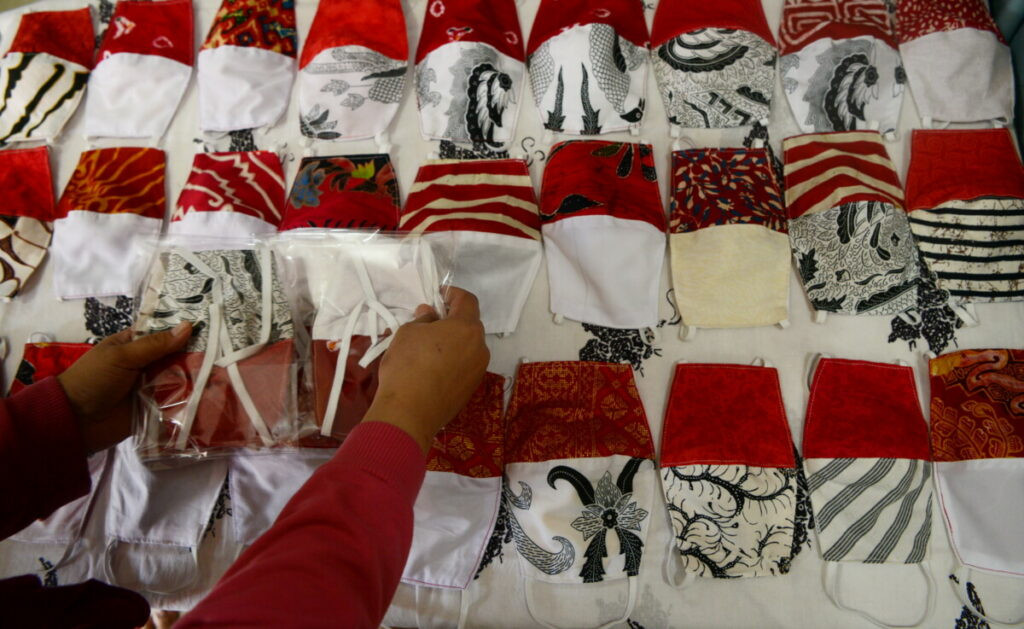Popular Reads
Top Results
Can't find what you're looking for?
View all search resultsPopular Reads
Top Results
Can't find what you're looking for?
View all search resultsBatik producers look to face masks to survive pandemic
After being hit hard by the economic crisis in the first three months of the COVID-19 pandemic, batik producers in many parts of Indonesia have begun to find their feet making and selling batik cloth masks.
Change text size
Gift Premium Articles
to Anyone
A
fter being hit hard by the economic crisis in the first three months of the COVID-19 pandemic, batik crafters in many parts of Indonesia have begun to find their feet making and selling batik cloth masks.
Haryati Suroso, owner of Batikque Batik in Sleman, Yogyakarta, told Kompas daily newspaper on Friday that her business had been shaken when the pandemic forced most tourism destinations and hotels in the province to temporarily shut down.
During the early stages of the pandemic, she said, her business relied on the Upakarti Sleman Gallery to sell its products.
“We used to be able to make displays and provide batik-making classes at hotels and tourism destinations, but all of those establishments have been forced to limit their operations during the pandemic,” said Haryati.
While in normal times Haryati’s business could bring in at least Rp 20 million (US$1,345) per month, in those three months, she made zero revenue.
Haryati began to see a light at the end of the tunnel in May when she received orders for cloth masks from several government institutions as part of a program managed by the region’s COVID-19 task force.
Read also: Most small businesses could shut down in six months due to COVID-19: UNIDO
“At that time, we still had a lot of left-over cloth or cloth with mixed up colors, so we turned it into cloth face masks,” said Haryati, who began making batik in 2012.
Since receiving the orders in May, she began to find a market by selling her products online. Today, Haryati can earn at least Rp 5 million a month.
“We’re starting to recover in terms of selling batik clothes, but our revenue is still half what it was,” she added.
Elsewhere, Lily Mariasari, a fashion designer and founder of Elemwe boutique, said that her business’ earnings dropped 70 percent at the beginning of the pandemic.
Despite the difficulties of the time, she decided to continue supporting batik crafters in Jakarta to help them stay afloat.
Twelve batik makers that Lily supports live in a low-cost apartment in Tambora, West Jakarta. She has been supporting them since October 2019. The crafters produce batik clothes with motifs inspired by Jakarta’s Betawi culture.
Read also: Small businesses resort to online channels to survive pandemic
“We’re lucky that these crafters can still create clothes, especially during the pandemic. They even managed to take part in the Karya Kreatif Indonesia [Indonesia’s Creative Creation] event held by Bank Indonesia,” said Lily.
She added that the crafters were mothers and wives, who used to only produce 12 items per week. “But now they can create 20 batik items per week.”
With the help of these women and other batik makers in Jakarta, Lily said her boutique could produce 5,000 batik cloth masks per day.
“Around 70 percent of my orders are for cloth face masks, while the remaining are for batik clothes, outfits and accessories,” she added.
Meanwhile, Agustina Giarawati, a batik cloth producer from Surakarta, Central Java, said her business lost about 80 percent of its earnings in the early days of the pandemic.
In the first month of the pandemic, she was only able to sell 1,000 batik clothes – an amount that in normal times, she could sell in a week.
However, several months later, her business began to rebound after receiving face mask orders for donations, a market that quickly grew.
To produce the face masks, she uses stamped batik cloth.
“My daily revenue is around Rp 500,000. The orders mostly come from Bali and Surakarta,” said Agustina. (nkn)
Editor’s note: This article is part of a public campaign by the COVID-19 task force (Satgas COVID-19) to raise people’s awareness about the pandemic.










